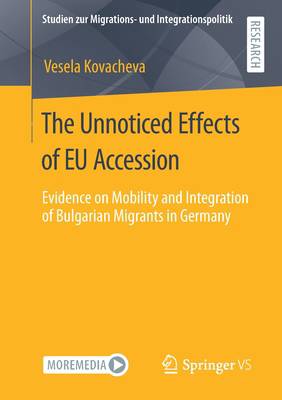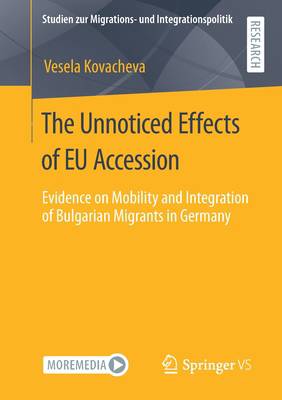
- Retrait gratuit dans votre magasin Club
- 7.000.000 titres dans notre catalogue
- Payer en toute sécurité
- Toujours un magasin près de chez vous
- Retrait gratuit dans votre magasin Club
- 7.000.0000 titres dans notre catalogue
- Payer en toute sécurité
- Toujours un magasin près de chez vous
The Unnoticed Effects of EU Accession
Evidence on Mobility and Integration of Bulgarian Migrants in Germany
Vesela KovachevaDescription
This study provides empirical evidence on the considerable but often unnoticed impact of EU accession on the mobility and integration of migrants from Bulgaria in Germany. Original data from a time-location sampling survey in Hamburg reveal that free movement not only induced a high level of mobility among EU citizens from Bulgaria after 2007 but also enabled their more permanent settlement in Germany. The study also provides statistical evidence that EU citizenship contributed to better legal integration of Bulgarian migrants in Germany, but national policies shaped to a greater extent their integration in terms of participation in the core areas of life. Restrictive policies such as transitional periods in the freedom of work hampered labour market integration and created more disadvantaged positions for workers. Inclusive policies such as the dual citizenship policy facilitated the naturalisation of settled migrants and led to exceptionally high naturalisation rates for Bulgarians that point to their successful integration in society. However, integration successes remain almost unnoticed in public discourse, which is dominated by the image of Bulgarian migration as a challenge.
Spécifications
Parties prenantes
- Auteur(s) :
- Editeur:
Contenu
- Nombre de pages :
- 231
- Langue:
- Anglais
- Collection :
Caractéristiques
- EAN:
- 9783658331092
- Date de parution :
- 09-03-21
- Format:
- Livre broché
- Format numérique:
- Trade paperback (VS)
- Dimensions :
- 148 mm x 210 mm
- Poids :
- 312 g

Les avis
Nous publions uniquement les avis qui respectent les conditions requises. Consultez nos conditions pour les avis.






